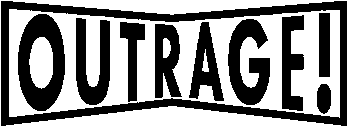


The most articulate advocate of lesbian and gay rights in Britain is the activist Peter Tatchell, one of the leaders of the Queer Rights Group OutRage!. He put the case for gay rights in this article for the 'The Independent on Sunday'.
This article is also reprinted in 'The Penguin Book of Twentieth Century Protest', 1998.
'We're here! We're queer! Get used to it!' Some of us are quite happy to call ourselves queer. A once-despised word no Ionger makes us recoil in fear. Indeed, it is fast becoming a proud symbol of the angry and assertive New Queer Politics of the 1990s.
There have been no significant homosexual law reforms since the Sexual Offences Act partially decriminalised male homossexuality in England and Wales exactly twenty-five years ago.
A quarter of a century later, thousands of Iesbians and gay men are still sacked from their jobs, convicted for consensual sex, beaten up by queer-bashers, denied custody of their children, and driven to attempt suicide.
The New Queer Politics is about seizing the vocabulary of oppression and transforming it into a language of liberation; appropriating a traditional term of homophobic abuse and redefining it as an expression of pride and defiance. By proclaiming ourselves queer, we subvert the derogatory meaning of the word and undermine its effectiveness as an insult. Responding to taunts with an unexpected "Yes, I am queer, so what!' deflates the power of the abuse, disarms the abuser, and empowers the intended victim.
Adoption of the Q-word is also a conscious attempt to ditch the politeness of 'gay' in favour of the unpleasantness of 'queer', which reflects more accurately the way we are still perceived and treated by society. Whereas the term 'gay' masks the reality of homophobia, 'queer' forces people to face up to it. Queer is the brutal truth. However, the New Queer Politics is a battle over not just language but also the innovative and challenging ideas that go with it: the celebration of sexual diversity. In a democratic and multicultural society, sexual difference, like racial difference, ought to be respected and valued. Alas, it is not.
Some think queers should present a respectable image and emphasize that
we are just the same, and just as good, as heterosexual men and women. But
why should we have to lead blameless lives, or be able to pass as hetero, in
order to win equal treatment?

Blurring the distinction between heterosexuals and homosexuals is profoundly dishonest. Queers are not the same as heterosexuals. Our sexuality gives many of us experiences and perspectives that are different. That difference is no bad thing, and certainly nothing to apologise for or hide.
The New Queer Politics rejects the stereotype of queers as victims. Being lesbian or gay is not just an endless story of discrimination and suffering. It has advantages. Compared with most heterosexuals we tend to have a wider range of sexual partners and to be more sexually adventurous. We've adapted better to safer sex. We find intimacy and openness with new partners easier. We generally have a broader network of friendships which cut across class and race. We're less compulsive about parenthood. We don't need marriage to sustain our relationships. We are likely to stay on friendlier terms with former partners. All these worthwhile aspects make me thankful to be queer.
Much of the lesbian and gay movement has traditionally argued that improving the lives of queers demands our integration into mainstream heterosexual society. The New Queer Politics questions that. Why should queers change to 'fit in' with the dominant sexual values, the morality of the majority? Surely it's prejudiced heterosexuals amd homophobic institutions that ought to change?
Unfortunately the debate about equal rights is based on the assumption that equality for queers should be on heterosexual terms: extending the legislation governing heterosexuality to lesbians and gay men. That may be a desirable first step, but it has limitations. Heterosexuality is often 'strait-jacketed' by repressive laws, such as those governing prostitution, and sexually explicit imagery, and those that make it an offence against public decency for a couple to have sexual intercourse in lovers'-lane-type locations, where no one has actually been offended. Equality for homosexuals in these areas would merely mean equal victimisation. We aim for the removal of all controls on sexual expression between consenting adults.
Likewise, queers do not aspire to equality with regard to the heterosexual
age of consent. Yes, there should be safeguards against abuse of children.
But the law criminalises any seventeen-year-old who has sex with a consenting
fifteen-year-old. It's just another example of a culture that is negative about
sex, which hurts heterosexuals and homosexuals.

The New Queer Politics looks beyond equality, and challenges the assumption that lesbian and gay desire is an intrinsically minority sexual orientation. It argues that everyone is potentially homosexual (and heterosexual). While some biological factors may predispose individuals to a sexual preference, all the psychological and anthropological evidence suggests that sexuality is primarily culturally conditioned, and is not rigidly compartmentalised.
None of us is wholly attracted to one sex or the other. We are all a mixture of desires. Some we express, others we repress. 'Queer' emancipation is therefore in the interests of heterosexuals, too. They also are diminished by a system of homophobia that prevents them from relating sexually and emotionally to half of humanity: people of the same sex. In this sense, lesbian and gay rights are about the right of everyone to experience the joys of queer desire without guilt or discrimination.

| OutRage! Home Page | I Can See Queerly Now | Queer Intelligence | Queer History | Links to other Sites |